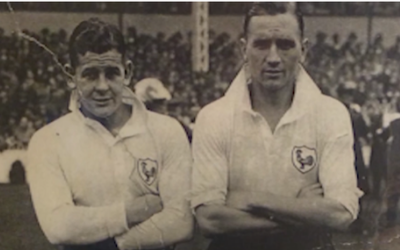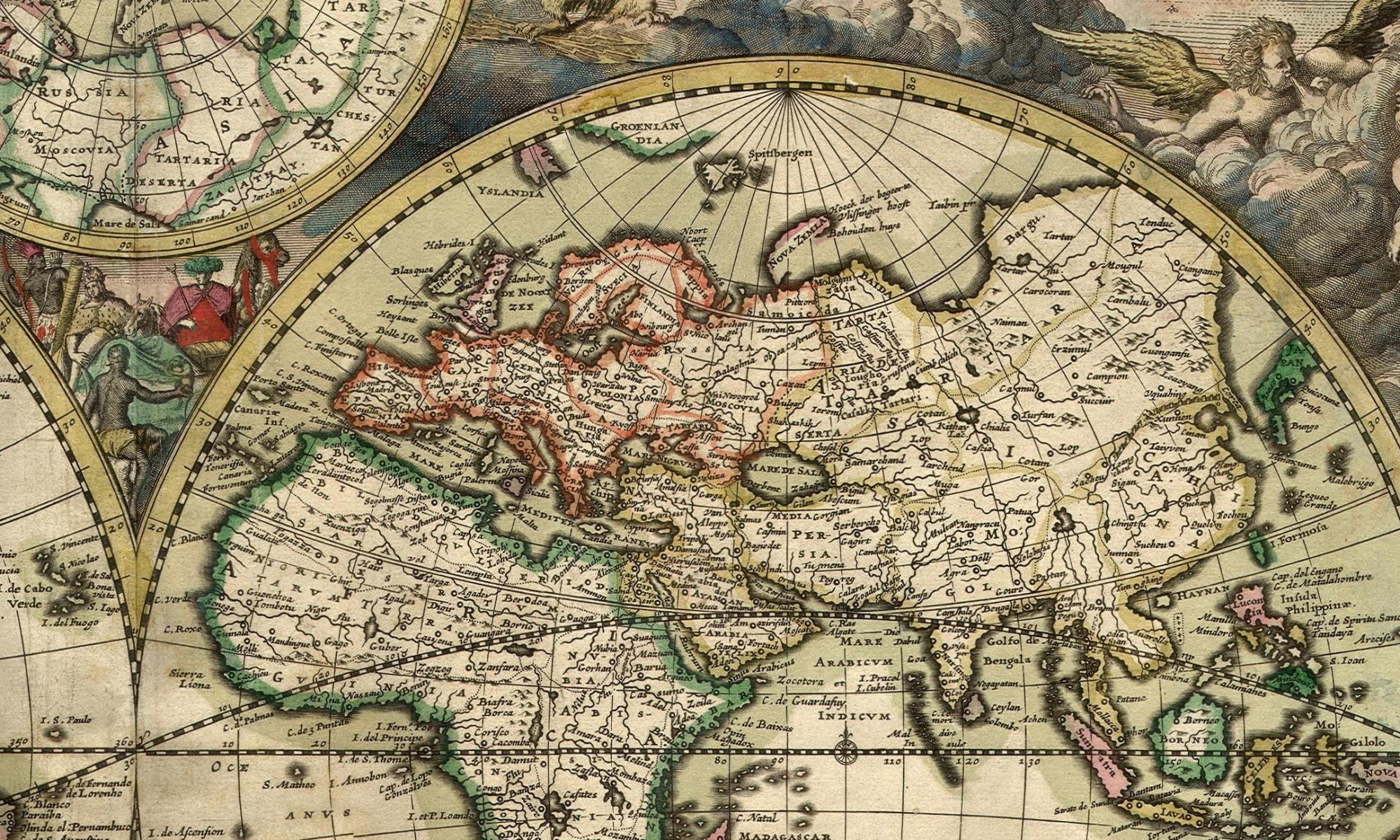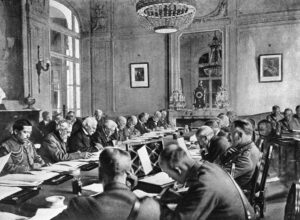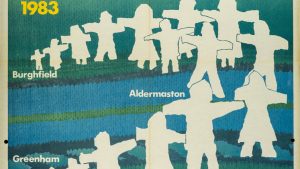On Saturday 2nd April, Professor Annika Mombauer gave a well-received lecture to the OU History Society. The lecture explored German attitudes towards the Armistice in November 1918 and the Treaty of Versailles. It asks why Germans do not mark Armistice day with a minute’s silence and whether in fact peace began for Germans on 11th November 1918.
Online exhibition as part of Dr. Richard Marsden’s Blaenau Gwent heritage project
BG REACH (Blaenau Gwent Residents Engaging in Arts, Culture and Heritage) is a collection of art, music, creative writing and film that tells the history of the area. Since 2020, the project has been led by local people, supported by academics from The Open University’s Faculty of Arts and Social Sciences, Linc Cymru Housing Association and Aberbeeg Community Centre.
In July 2021, an online exhibition was launched that includes video diaries, digital stories, creative writing, paintings, drawings, music and film produced by people living in Blaenau Gwent. It can be viewed for free at the OU’s free learning site OpenLearn.

Fred Pettican and team mate, 1960
Image: Fred Pettican
Digital stories: remembering the past
The digital stories feature residents of Llys Glyncoed extra care scheme, near Ebbw Vale, who were interviewed by year nine pupils from Ebbw Fawr Learning Community. One of the Llys Glyncoed residents, Fred Pettican tells of his memory of playing football for Newport side Victoria against Bridgend in 1960. His corner was headed in by a player who coincidentally came to live in Llys Glyncoed at the same time as Fred. He also still has the match ball from the game!
Poems and prose
Many of BG REACH’s participants have produced poems and prose to capture the history of the area and their feelings of growing up there. In Remembering Cwmtillery, 61 year-old Stephen Davies recalls visiting his grandmother as a child. He has also produced sketches of some of the landmarks mentioned in his work.

Sketch of Cwmtilley Pithead
Image: Stephen Davies
We would then return to my nan’s house in West Bank. And have tea. She made nice apple tart + custard. She also made her own bread pudding. And rice puddings. They were the days people made and cooked their own food. Very different from today.
After tea. I would meet up with a few friends I knew. We would have lots of fun. Sliding down the bank. From Top Rows to West Bank. On bits of cardboard. This banking is now covered in large trees. And my nans old house is gone. Sadly. Both mam and dad. Have now passed away.
Extract from Remembering Cwmtillery by Stephen Davies
In her poem Bathed in Birdsong, Susan Davies describes the peaceful surroundings of the valleys, made all the more quieter as a result of the coronavirus lockdown.
Bathed in Birdsong
Bathed in birdsong, I love this place of peace
Enjoyed the spring here
Which was almost stolen from me, but was in fact, enriched
A little further on the lambs are baaing
Another treasure uncovered
Unseen by me for years
Extract from Bathed in Birdsong by Susan Davies

Modron
Image: Barbara Candish
Paintings and photography
Visual artwork also forms part of the exhibition, including The Guardian by Mark Burns, based on the Six Bells Guardian; Modron by Barbara Candish, which is a painting and accompanying poem celebrating a mythic Welsh warrior Queen of the Silures tribe which once occupied the area; and photography by Linda Stemp which captures some of the area’s historic buildings.
Dr Richard Marsden, academic lead on the BG REACH project said:
“The key to unlocking the hidden history of Blaenau Gwent was to support participants to design the project themselves – to decide what they wanted to focus on and how best to achieve that. The artworks, poems, stories and songs in the online exhibition are a celebration of Blaenau Gwent’s heritage expressed through the talents of the people who live there. The Gwent valleys are part of Wales’ forgotten heritage. They’re often associated with industrial fervour followed by economic decline, but – as people will see from taking a look at the exhibition – there’s so much more to them than that.”
The impact of the pandemic
The coronavirus had an impact on much of the project. A musical piece, Cynefin, was written by some of the group members with a view to performing it live. The pandemic put a halt to their plans, but the group continued to meet online, and recorded Cynefin 2 over video. Cynefin is a Welsh work referring to a person’s connection to an area and its people. The tune draws on Welsh folk music, including lullaby Suo Gân and love song Ar Lan y Môr.
Member of the Senedd for Blaenau Gwent Alun Davies addressed attendees of the launch.
Blaenau Gwent MS Alun Davies said:
“The Blaenau Gwent REACH project, coordinated by The Open University in Wales in partnership with Linc Cymru Housing Association and Aberbeeg Community Centre, is a fantastic example of bringing people together and of the power of using creative arts to explore identity and heritage.”
Dr Donna Loftus’s paper at The History and Future of the Moral Economy workshop
Senior Lecturer in History Dr Donna Loftus presented a paper on “The ‘paradox of thrift’: economic visions of nineteenth-century Britain” at The History and Future of the Moral Economy online workshop in June 2021.
Morality and its relationship to economic behaviour has long fascinated historians and social scientists. The history of capitalism, development, and environmental change possesses an ethical dimension that is evident from the medieval period through to the present. This is evidenced by phenomena such as the planned economy, the emergence of neoliberalism, and features in current debates about a Green New Deal. But how has morality been central to the way in which people have understood their relationship to wider social change in the past and does this still matter today? The workshop explored these ideas, as well as exploring both the (various) histories and the (possible) futures of the Moral Economy.
Sandip Hazareesingh’s presentation at Heritage and Our Sustainable Future
Dr Sandip Hazareesingh gave a presentation on ‘Millet heritages and climate adaptation in southern India’ in the context of a conference on Heritage and our Sustainable Future held 22 February-2 March 2021, and hosted by Praxis at the University of Leeds and the UK National Commission for UNESCO. The presentation focused on how millet farming cultural heritages, accessed through oral history, have enabled local communities to adopt climate mitigation strategies to ensure food security. You can watch a video of Dr Hazareesingh’s presentation here.
Blaenau Gwent arts project celebration event
Aspiring Poets, musicians and artists from across Blaenau Gwent got together over video last month in a cultural celebration of their area, history and people.
The group are part of BG REACH (Blaenau Gwent Residents Engaging in Arts, Culture and Heritage) a celebration of the heritage, history and people of Blaenau Gwent past and present, led by Dr. Richard Marsden, Senior Lecturer and Staff Tutor in History. The group met for the first time in February 2020 at creative workshops in Aberbeeg. The pandemic cut short face-to-face sessions, but the group kept in touch over video and carried on working together.
‘Back then we didn’t anticipate the imminent challenges to come in the form of severe flooding and then a global pandemic,’ explains Sarah Roberts, the OU in Wales’ partnerships coordinator for south-east Wales. ‘But by working together and mainly down to the commitment and passion of people within the Aberbeeg community group, here we are today to share and celebrate some of the creative work that’s been happening during these challenging times.’
During the online celebration, the group shared a music project, poems, art and photography with each other and the Open University academics who had worked with them. Linc Cymru Housing Association staff, who also supported the project, were among the attendees alongside family and friends. Cynefin2, a video created and recorded remotely by the group during the pandemic which celebrates in words and music the beauty of the area, was also premiered during the event.
The BG REACH team hope to keep gathering more creative work which celebrates heritage in Blaenau Gwent. This can include photography, creative writing, artwork, or music which will be shown in an exhibition in 2021. If you live in the area and interested in sharing your work email [email protected] to find out more.
Silvia De Renzi’s lectures in Italy
Sandip Hazareesingh’s presentation at IIED event
Research Fellow Dr. Sandip Hazareesingh gave a presentation titled ‘Oral history as a method for studying the meanings of foodways in India’ at a virtual international workshop jointly organised by the International Institute for Environment and Development and Kew (13-15 October 2020 at the IIED) on ‘Indigenous food systems, biocultural heritage and the UN sustainable development goals’
Karl Hack and Singapore’s bicentennial celebrations
Karl Hack published a book chapter and gave two papers in Singapore in 2019 as part of its bicentennial celebrations: 200 years form Sir Stamford Raffles landing on Singapore and founding it in its modern guise.
The papers were on ‘Special Branch and identifying communists’ at the National Museum of Singapore in November, and on ‘British Grand Strategies and Southeast Asia’ at the National University of Singapore-Rise of Asia Museum workshop at Haw Par Villa Singapore in December. The chapter on ‘We Shall Meet again: Britain’s return to Singapore 1945-46’ is in 200 Years of Singapore and the United Kingdom edited by Tommy Kohn and British High Commissioner for Singapore Scott Wightman. Karl was born at Changi, Singapore and worked in the city for more than a decade, so this forms part of his ongoing relationship with Singapore as his second home, and Southeast Asia as a region.
Dr Sandip Hazareesingh keynote address ‘Food Memories and Stories from Karnataka women farmers’
How historical research can contribute to international development challenges
Dr Sandip Hazareesingh delivered a keynote address titled ‘Food Memories and Stories from Karnataka women farmers’ at a GCRF event on ‘Food and Heritage’ at the University of Leeds on 10 January. The event was organised by Praxis, a recently set up project funded by AHRC-GCRF with the aim of championing the distinctive contribution that Arts and Humanities research can make to tackling urgent development issues. https://changingthestory.leeds.ac.uk/praxis/
New online resource on UK peace activism in the Cold War
On 21 November a new online resource for exploring the British peace movement during the height of the Cold War was launched, developed by our own Dr Luc-André Brunet. This resource, entitled ‘Peace Activism in the UK during the Cold War’, is a collaboration between The Open University and the Peace and Security project at LSE IDEAS, of which Dr Brunet is Co-Director. You can explore it here.
This online resource features newly digitised documents from the collection of the Campaign for Nuclear Disarmament (CND), housed at LSE Library, providing new insights into different aspects of the British peace movement in the 1980s. These are complemented with video commentary by activists, policymakers, and academics. Organised around six themes, the resource enables students, researchers, current activists, and members of the public to reassess peace activism in the Cold War and to draw lessons that can be applied to the international situation today.
The resource was launched with a public event at LSE on 22 November, featuring Dr Brunet, CND General Secretary Kate Hudson, and Sam Dudin from the Royal United Services Institute (RUSI). Event details can be found here.


